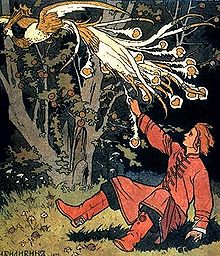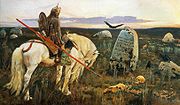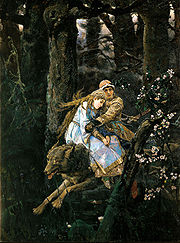
Tsarevitch Ivan, the Fire Bird and the Gray Wolf
Encyclopedia

Ivan Tsarevich
Ivan Tsarevich is one of the main heroes of Russian folklore, usually a protagonist, often engaged in a struggle with Koschei. Along with Ivan the Fool, Ivan Tsarevich is a placeholder name rather than a certain character....
, the Fire Bird and the Gray Wolf is a Russian fairy tale
Fairy tale
A fairy tale is a type of short story that typically features such folkloric characters, such as fairies, goblins, elves, trolls, dwarves, giants or gnomes, and usually magic or enchantments. However, only a small number of the stories refer to fairies...
collected by Alexander Afanasyev
Alexander Afanasyev
Alexander Nikolayevich Afanasyev was a Russian folklorist who recorded and published over 600 Russian folktales and fairytales, by far the largest folktale collection by any one man in the world...
in Narodnye russkie skazki
Narodnye russkie skazki
Russian Fairy Tales , is a collection of Russian fairy tales, collected by Alexander Afanasyev and published by him between 1855 and 1863. His work was explicitly modeled after the Brothers Grimm's work, Grimm's Fairy Tales....
.
It is Aarne-Thompson type 550, the quest for the golden bird/firebird. Others of this type include The Golden Bird
The Golden Bird
"The Golden Bird" is a Brothers Grimm fairy tale, number 57, about the pursuit of a golden bird by a king's three sons.A French version, collected by Paul Sébillot, is called The Golden Blackbird. Andrew Lang included that variant in The Green Fairy Book.It is Aarne-Thompson folktale type 550,...
, The Greek Princess and the Young Gardener
The Greek Princess and the Young Gardener
The Greek Princess and the Young Gardener is an Irish fairy tale collected by Patrick Kennedy in Fireside Stories of Ireland. Joseph Jacobs included it in More Celtic Fairy Tales....
, The Bird 'Grip'
The Bird 'Grip'
The Bird 'Grip is a Swedish fairy tale. Andrew Lang included it The Pink Fairy Book. It is Aarne-Thompson type 550, the quest for the golden bird/firebird; other tales of this type include The Golden Bird, The Greek Princess and the Young Gardener, How Ian Direach got the Blue Falcon, The Nunda,...
, How Ian Direach got the Blue Falcon
How Ian Direach got the Blue Falcon
How Ian Direach got the Blue Falcon is a Scottish fairy tale, collected by John Francis Campbell in Popular Tales of the West Highlands. He recorded it from a quarryman in Knockderry, Roseneath, named Angus Campbell....
, and The Nunda, Eater of People
The Nunda, Eater of People
The Nunda, Eater of People is a Swahili fairy tale collected by Edward Steere in Swahili Tales. Andrew Lang included it in The Violet Fairy Book.It is Aarne-Thompson type 550, the quest for the golden bird/firebird.-Synopsis:...
.
Synopsis
A king's apple tree bore golden appleGolden apple
The golden apple is an element that appears in various national and ethnic folk legends or fairy tales. Recurring themes depict a hero retrieving the golden apples hidden or stolen by a monstrous antagonist...
s, but every night, one was stolen. Guards reported that the Firebird
Firebird (Russian folklore)
In Slavic folklore, the Firebird is a magical glowing bird from a faraway land, which is both a blessing and a bringer of doom to its captor....
stole them. The king told his two oldest sons that the one who caught the bird would receive half his kingdom and be his heir. They drew lots to see who would be first, but both fell asleep; they tried to claim it had not come, but it had stolen an apple. Finally Ivan Tsarevich
Ivan Tsarevich
Ivan Tsarevich is one of the main heroes of Russian folklore, usually a protagonist, often engaged in a struggle with Koschei. Along with Ivan the Fool, Ivan Tsarevich is a placeholder name rather than a certain character....
, the youngest son
Youngest son
The youngest son is a stock character in fairy tales, where he features as the hero. He is usually the third son, but sometimes there are more brothers, and sometimes he has only one; usually, they have no sisters....
, asked to try; his father was reluctant because of his youth but consented. Ivan remained awake the entire time, and upon seeing the bird, tried to catch it by the tail. Unfortunately, Ivan only managed to grasp one feather. The Firebird did not return, but the king longed for the bird. He said that still, whoever caught it would have half his kingdom and be his heir.


He met the wolf and admitted to his disobedience. It carried him to the kingdom and stables where he could get the horse and warned him against the golden bridle. Its beauty tempted him, and he touched it, and instruments of brass sounded. He was captured, and the Second King told him that if he had come with the word, he would have given him the horse, but now he would be spared only if he brought him Helen the Beautiful to be his wife.
Ivan went back to the wolf, confessed, and was brought to her castle. The wolf carried her off, but Ivan was able to assuage her fears. Ivan brought her back to the Second King, but wept because they had come to love each other. The wolf turned
Shapeshifting
Shapeshifting is a common theme in mythology, folklore, and fairy tales. It is also found in epic poems, science fiction literature, fantasy literature, children's literature, Shakespearean comedy, ballet, film, television, comics, and video games...
itself into the form of the princess and had Ivan exchange it for the Horse with the Golden Mane. Ivan and Helen rode off on the Horse. The wolf escaped the king. It reached Ivan and Helen, and Helen rode the horse and Ivan the wolf. Ivan asked the wolf to become like the horse and let him exchange it for the Firebird, so that he could keep the horse as well. The wolf agreed, the exchange was done, and Ivan returned to his own kingdom with Helen, the horse, and the Firebird.
The wolf said its service was done when they returned to where it had eaten Ivan's horse. Ivan dismounted and lamented their parting. They went on for a time and slept. His older brothers
False hero
The false hero is a stock character in fairy tales, and sometimes also in ballads. The character appears near the end of a story in order to claim to be the hero or heroine and is, therefore, always of the same sex as the hero or heroine. The false hero presents some claim to the position. By...
found them, killed Ivan, sliced his body to pieces, and told Helen that they would kill her if she would not say that they had fairly won the horse, the firebird, and her. They brought them to their father, and the second son received half the kingdom, and the oldest was to marry Helen.
The Grey Wolf found Ivan's body and caught two fledgling crows that would have eaten it. Their mother pleaded for them, and the wolf sent her to fetch the water of death, which restored the body, and the water of life, which revived him. The wolf carried him to the wedding in time to stop it; the older brothers were made servants or killed by the wolf, but Ivan married Helen and lived happily with her.
See also
- The Golden MermaidThe Golden MermaidThe Golden Mermaid is a German fairy tale. Andrew Lang included it in The Green Fairy Book, attributing it to the Brothers Grimm, but there are noticeable differences between it and the common Grimm version of The Golden Bird.-Synopsis:...
- Laughing Eye and Weeping EyeLaughing Eye and Weeping EyeLaughing Eye and Weeping Eye or The Lame Fox is a Serbian fairy tale collected by A. H. Wratislaw in his Sixty Folk-Tales from Exclusively Slavonic Sources, number 40. Andrew Lang included it in The Grey Fairy Book.-Synopsis:...
- The Nine Peahens and the Golden ApplesThe Nine Peahens and the Golden ApplesThe Nine Peahens and the Golden Apples is a Serbian epic poetry. It was published for the first time as a fairy tale by Vuk Stefanović Karadžić in 1853. Later on it was published as a Bulgarian fairy tale by A. H...
- Prâslea the Brave and the Golden ApplesPrâslea the Brave and the Golden ApplesPrâslea the Brave and the Golden Apples is a Romanian fairy tale collected by Petre Ispirescu in Legende sau basmele românilor.-Synopsis:...
- The Firebird and Princess VasilisaThe Firebird and Princess VasilisaThe Firebird and Princess Vasilisa is a Russian fairy tale collected by Alexander Afanasyev in Narodnye russkie skazki.It is Aarne-Thompson type 531. Other tales of this type include Ferdinand the Faithful and Ferdinand the Unfaithful, Corvetto, King Fortunatus's Golden Wig, and The Mermaid and...
- The Bold Knight, the Apples of Youth, and the Water of LifeThe Bold Knight, the Apples of Youth, and the Water of LifeThe Bold Knight, the Apples of Youth, and the Water of Life is a Russian fairy tale collected by Alexander Afanasyev in Narodnye russkie skazki.-Synopsis:...
- The Death of Koschei the DeathlessThe Death of Koschei the DeathlessThe Death of the Immortal Koschei or Marya Morevna is a Russian fairy tale collected by Alexander Afanasyev in Narodnye russkie skazki and included by Andrew Lang in The Red Fairy Book...
External links
- Annotated tale at SurLaLune Fairytales (The elder brothers are made servants)
- Illustrated tale at The Russian Folk Art (The elder brothers are killed by the wolf)

